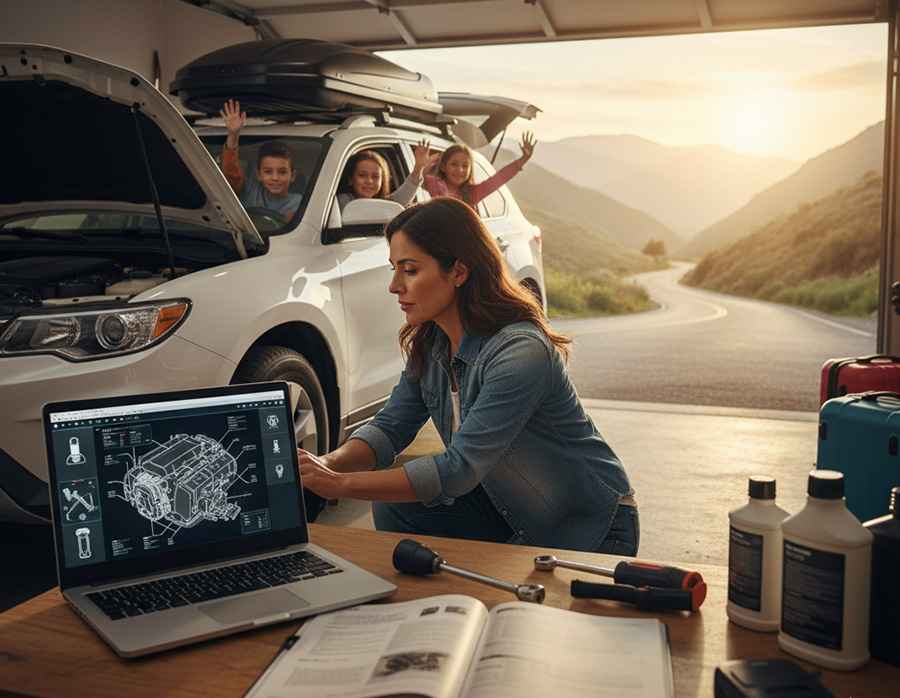Why Checking Your Car's Condition Before a Trip is Essential
Road trips promise exploration, relaxation, and memories with family or friends. The reality, however, is that the excitement of hitting the open road can quickly turn into a nightmare when your car isn't fully prepared. Pre-trip inspection isn't just a smart idea, it's a critical safety step that protects you, your passengers, and your wallet from breakdowns that could occur during the journey and cost a fortune to repair when you're miles from home.

The Connection Between Preventive Maintenance and Safe Travel
Safe driving isn't only about following speed limits and avoiding distractions. Your car's condition is just as important to everyone's safety on the highway.
Preventive Maintenance Supports Safe Travel By:
- Verifying brakes function properly in emergency situations
- Ensuring tire integrity to prevent high-speed blowouts
- Maintaining cooling systems to avoid engine damage
- Confirming lights and signals work for communication with other drivers
- Checking steering and suspension components are secure
A well-maintained vehicle gives you control and confidence, while a neglected one becomes unpredictable and dangerous.
Catching small issues before they develop into major failures can mean the difference between reaching your destination safely or being stranded, or worse, experiencing an accident.
The Hidden Dangers of Long-Distance Travel Without Proper Inspection
Most drivers assume their vehicle is road-ready simply because it handles daily commutes without problems.
Unfortunately, there's a significant difference between what your vehicle can handle during short trips versus extended travel.
Stress on Critical Components
Highway driving and sustained operation expose weaknesses:
- Extended high speeds: Generate more heat in the engine, transmission, and tires.
- Heavy loads: Extra passengers and luggage stress suspension and braking systems.
- Varied terrain: Mountain roads or desert highways reveal cooling system vulnerabilities.
- Continuous operation: Minor oil leaks or fluid consumption become major problems.
Costly Consequences of Breakdowns
Breaking down away from home isn't just inconvenient:
- Towing charges: Can cost $100-300 or more in remote areas.
- Emergency repairs: Unfamiliar mechanics often charge premium rates.
- Lodging expenses: Hotel stays while waiting for parts or repairs.
- Lost vacation time: Hours or days spent dealing with mechanical problems.
- Potential danger: Being stranded on busy highways or isolated roads.
A $50 pre-trip inspection can save you thousands in emergency repairs and ruined vacation plans.
Using Service Guides to Diagnose Mechanical Issues
Understanding your vehicle's systems enables you to detect potential problems before traveling.
While professional inspection is valuable, car service and repair manuals available through eManualOnline allow you to check everything yourself using manufacturer specifications and detailed instructions.
Critical Systems to Inspect
Fluid Levels and Condition:
- Engine oil (level and color indicating contamination)
- Coolant (verify correct mixture and no leaks)
- Brake fluid (sufficient level and clear appearance)
- Power steering fluid (proper level verification)
- Windshield washer fluid (top off for visibility)
Tire Health:
- Tread depth (minimum 4/32" for safe highway travel)
- Tire pressure (check when cold, including spare)
- Sidewall condition (look for cracks, bulges, or damage)
- Wear patterns (should be even across tread)
Brake System:
- Pad thickness (minimum 3mm remaining)
- Rotors (check for scoring or warping)
- Brake pedal firmness (not spongy or sinking)
- Warning lights (investigate any illuminated indicators)
Lights and Electronics:
- Headlights (low and high beams)
- Turn signals and hazard lights
- Brake lights and reverse lights
- Dashboard warning lights (investigate any illuminated indicators)
Belts and Hoses:
- Serpentine belt (no cracks, fraying, or glazing)
- Coolant hoses (not soft, bulging, or brittle)
- Clamp security (all connections tight)
Real-Life Example: Preventing a Mountain Trip Disaster
Consider Sarah, who planned a mountain camping trip with her family, a 400-mile journey with winding uphill and downhill roads.
Two days before departure, she noticed a sweet smell near her vehicle but dismissed it as insignificant.
The Investigation
Rather than ignoring the warning sign, Sarah consulted her digital service manual to investigate:
- She traced the sweet smell to a potential coolant leak
- Following diagnostic procedures, she examined the cooling system
- Discovered a small split in the upper radiator hose near the clamp
- Found the coolant reservoir was slightly below the full mark
- Referenced the manual for correct hose specifications and replacement procedures
The Prevention
With guidance from car service and repair manuals, Sarah replaced the damaged hose for $25 and fifteen minutes of her time.
Had she not caught this problem, the hose would likely have burst on a steep mountain pass, causing overheating with potentially catastrophic consequences:
- Engine repair costs of $2,000-5,000
- Dangerous roadside emergency in an isolated location
- Fire risk from coolant spraying onto hot components
- Complete trip cancellation and emergency towing
Her proactive inspection, aided by reliable resources like eManualOnline, saved her vacation and prevented a potentially dangerous situation.
Making Pre-Trip Inspections a Routine
Vehicle preparation shouldn't depend on long journeys. Developing a habit of routine inspection helps you learn your car's normal condition so any abnormalities are easily identified.
Create a Simple Checklist:
- Check basics weekly during regular use
- Inspect thoroughly before any trip exceeding 200 miles
- Document maintenance history to track trends
- Address small problems immediately
Taking Responsibility for Your Own Safety
Your car is a complex machine requiring attention and care. Take time to perform an inspection before your next road trip.
Whether you use quality service manuals or have a trusted mechanic perform the work, this precautionary step protects everyone aboard and ensures your trip creates pleasant memories rather than becoming a costly disaster.
The small amount of time spent preparing your vehicle is insignificant compared to the peace of mind knowing your car is ready for whatever the road demands.